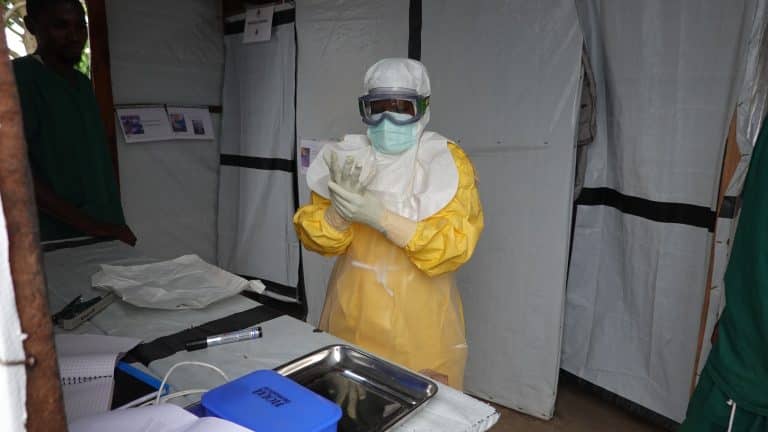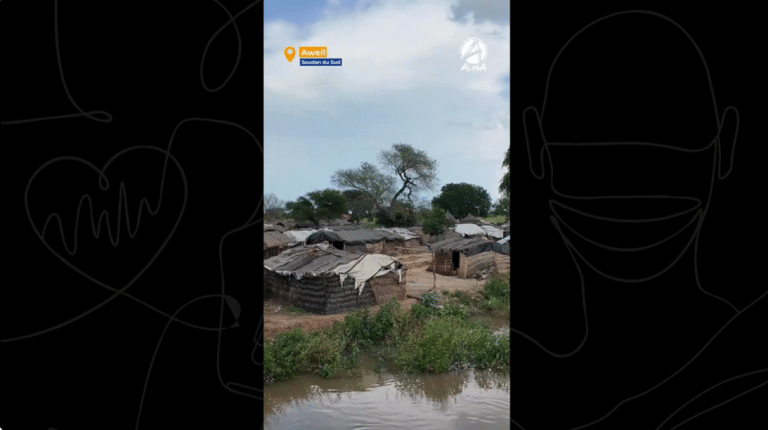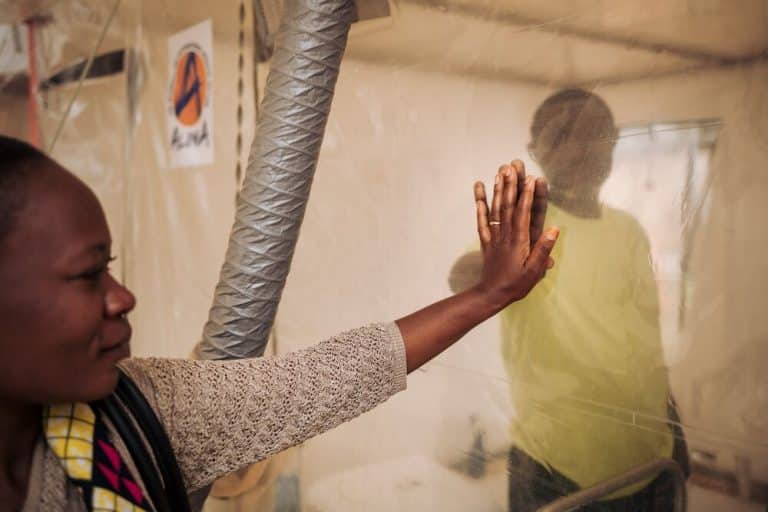Viral hemorrhagic fevers
📢 Up to 90% fatality rate for certain viral hemorrhagic fevers.
🚨 No vaccines or specific treatments available for many of these infections.
🦠 Highly contagious diseases requiring rapid and safe medical care.
Viral hemorrhagic fevers (VHF), such as Ebola, Lassa or Marburg, represent a major threat in West and Central Africa. ALIMA is committed to strengthening prevention, improving treatments and innovating in the response to epidemics.
Humanitarian context and challenge
Deadly viruses, often underestimated
VHF are highly contagious infections caused by different viruses and transmitted through:
- Direct contact with an infected patient’s body fluids.
- Exposure to urine and feces from infected rodents.
- Bites from insect vectors.
💡 Why does this matter?
- 🌍 Frequent and devastating epidemics, especially in Africa.
- 🚑 A lack of means to diagnose and treat patients quickly.
- 🏥 Complex management requiring a high level of biosecurity.
📌 Since 2009, ALIMA has responded to numerous outbreaks of VHF:
- Lassa fever in Nigeria
- Ebola virus disease in the DRC
- Ebola virus disease in Guinea
- Ebola virus disease in Uganda
- Marburg virus disease in Equatorial Guinea
- Marburg virus disease in Rwanda
- Rift Valley fever in Niger
- Rift Valley fever in CAR
➡️ To address these challenges, ALIMA is developing adapted solutions to strengthen prevention and treatment.
ALIMA’s action
💡 How does ALIMA fight viral hemorrhagic fevers?
Thanks to its expertise acquired from past epidemics in Guinea, DRC, Niger, and Nigeria, ALIMA deploys an integrated approach combining prevention, treatment, research and innovation.
🔹Epidemic prevention and preparedness
- Training of healthcare workers and local medical teams, particularly through a University Diploma on viral hemorrhagic fevers, arboviruses, and emerging diseases, co-developed with the Joseph Ki-Zerbo University in Burkina Faso, with ALIMA leading practical modules.
- Community awareness of best practices to limit transmission.
- Strengthening epidemiological surveillance systems for early outbreak detection.
- Prepositioning medical supplies and biomedical equipment, including personal protective equipment.
🔹Medical management and patient treatment
🏥 Specialized centers for viral hemorrhagic fever patients.
💉 Deployment of experimental treatments in collaboration with research institutes.
⚠️ Strict biosecurity measures to protect healthcare and limit the spread.
🔹 Research and innovation for better care
🔬 Clinical research on treatments and vaccines for Ebola and Lassa
- Guinea: participation in the PREVAC and PREVAC-UP vaccine trials (in partnership with INSERM and NIH).
- Nigeria: ongoing Lassa fever studies with the University of Oxford and ALERRT.
- DRC: clinical trials conducted with the WHO and the National Institute for Biomedical Research to identify two effective Ebola treatments.
📌 ALIMA systematically integrates research with humanitarian action to improve the management of epidemic diseases.
🔹 The CUBE: an innovation revolutionizing patient care
🛠 The CUBE (Biosecure Emergency Room for Epidemics), developed by ALIMA, offers:
- Safe access to patients without direct exposure of caregivers.
- A more humane hospitalization, with transparent walls allowing patients to see their loved ones.
- Better treatment conditions, reducing the need for full protective suits.
📌 Since 2009, ALIMA has deployed over 30 CUBEs to treat Ebola patients.
Frequently Asked Questions (FAQs)
- Direct contact with the body fluids of an infected person.
- Exposure to animal reservoirs (rodents, bats, mosquitoes).
- Insufficient protection when caring for infected patients.
- High fever, extreme fatigue, and muscle pain.
- Vomiting, diarrhea, and unexplained bleeding.
- Severe cases may lead to kidney and liver failure.
- Limited treatment options and vaccines are not available for all VHFs.
- Management requires advanced biosecurity equipment.
- Case detection is complex due to the lack of access to rapid diagnostics.
On the ground
Related news

Three Months to Eradicate Ebola: The Power of Collective Action in Kasai
After three months of collective mobilization, the 16th Ebola outbreak in the Democratic Republic of the Congo (DRC) was declared over on November 30, 2025.

South Sudan: when the climate crisis becomes a health crisis
In Aweil, recurring floods cut off entire villages. Malaria, diarrhea, pneumonia: children are on the front lines. Since 2025, ALIMA has been deploying an emergency

Ebola in Kasai: A Race Against Time!
Since late August, a new Ebola outbreak has struck Kasai in the Democratic Republic of Congo. With 40 deaths already and more than 1,400 contacts


